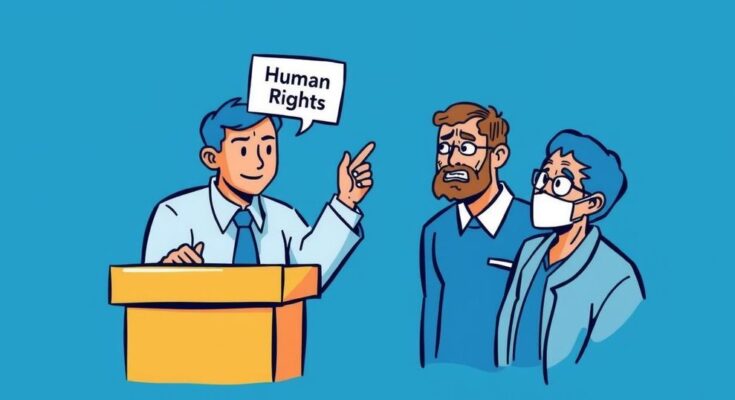This election underscores the vital role of Jewish commitment to global human rights. GOP policies threaten essential rights for women and LGBTQ communities worldwide. The outcome hinges on safeguarding democracy and dignity for vulnerable populations, echoing an urgent call to action within the Jewish community to advocate for justice beyond U.S. borders. The stakes are high as electoral choices will shape lives across the globe, emphasizing the profound influence of American policies.
In this pivotal election, the Jewish commitment to human rights is more crucial than ever. Current Republican policies threaten the rights of women and LGBTQ communities globally. While the media highlights conflicts in the Middle East and Ukraine, other pressing human rights crises are often overlooked. It’s imperative that we, as Jews, remember our moral responsibility to advocate for dignity and justice for the world’s vulnerable populations, especially during this election season. From rampant gang violence in Haiti to genocidal threats against the Rohingya in Myanmar and early marriages for girls in India, the breadth of human suffering is immense. Jewish teachings stress the importance of looking beyond our borders and considering our impact on the global community. Our values compel us to support those fighting for their rights, reinforcing our commitment to human dignity and justice. Organizations like the American Jewish World Service champion democracy and human rights globally. The outcome of this election will reverberate far beyond the headlines, shaping the futures of millions across the globe. The U.S. wields significant influence, and the choices made here can either strengthen or weaken the support for democracy and rights worldwide, especially in a time when authoritarianism is on the rise. Consider Kenya, where the fate of LGBTQI+ rights depends largely on U.S. election outcomes. A proposed anti-homosexuality bill hangs in the balance, held back by U.S. diplomatic efforts. Should the new administration signal a lack of support, Kenyan lawmakers may push this bill through, endangering a community that already faces dire risks. The debate surrounding the President’s Emergency Plan for AIDS Relief (PEPFAR) is looming as well. Originating in 2003, this landmark initiative has saved millions from the clutches of HIV/AIDS. However, with anti-choice legislators on the prowl, this essential program faces the threat of restrictions that could devastate health services in over fifty countries, hindering lives in the process. Moreover, the ramifications of policies like the Mexico City Policy, or the Global Gag Rule, extend beyond America’s shores. By denying essential aid to organizations that provide reproductive services, even with their own funds, this policy amplifies unsafe practices and erodes maternal health. The continuum between U.S. electoral choices and global health outcomes cannot be overstated. As we stand at this critical juncture, the importance of this election looms large, demanding our attention and action. Each vote influences not just our domestic landscape, but also the safety and freedom of billions worldwide. It’s our duty as American Jews to advocate for those beyond our immediate reach, ensuring we do not turn away from the world that needs our help. In closing, as support for global human rights appears threatened, we must remember the responsibility that comes with our Jewish values. This election isn’t just about choosing leaders; it’s about safeguarding the rights and dignity of countless individuals worldwide. The choices made will either build a brighter future or leave us to grapple with the consequences of inaction.
This piece emerges from a complex time where the intersection of political action and human rights advocacy is profoundly evident. With global crises often overshadowed by national concerns, the article aims to shed light on the shared responsibility within the Jewish community to advocate for the most vulnerable populations worldwide. The discourse surrounding this election interweaves domestic and international challenges, emphasizing the far-reaching impact of U.S. policies and the moral obligation to uphold dignified human rights standards globally.
In conclusion, this election is pivotal not only for domestic policies but for the global human rights landscape as well. Jewish values call us to champion the rights of those in peril and to vocalize our concerns wherever injustice abounds. As we engage in the electoral process, we must remember the responsibility we carry to support vulnerable communities worldwide, ensuring that our choices reflect a commitment to dignity and justice for all.
Original Source: forward.com



